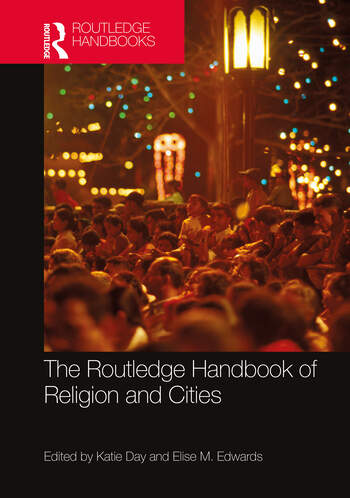Elise Edwards published a new edited volume, The Routledge Handbook of Religion and Cities, in partnership with Katie Day through Routledge in December 2020.


Here’s a description of the book:
Like an ecosystem, cities develop, change, thrive, adapt, expand, and contract through the interaction of myriad components. Religion is one of those living parts, shaping and being shaped by urban contexts. The Routledge Handbook of Religion and Cities is an outstanding interdisciplinary reference source to the key topics, problems, and methodologies of this cutting-edge subject. Representing a diverse array of cities and religions, the common analytical approach is ecological and spatial. It is the first collection of its kind and reflects state-of-the-art research focusing on the interaction of religions and their urban contexts. Comprising 29 chapters, by a team of international contributors, the Handbook is divided into three parts:
- Research methodologies
- Religious frameworks and ideologies in urban contexts
- Contemporary issues in religion and cities
Within these sections, emerging research and analysis of current dynamics of urban religions are examined, including: housing, economics, and gentrification; sacred ritual and public space; immigration and the refugee crisis; political conflicts and social change; ethnic and religious diversity; urban policy and religion; racial justice; architecture and the built environment; religious art and symbology; religion and urban violence; technology and smart cities; the challenge of climate change for global cities; and religious meaning-making of the city.
The Routledge Handbook of Religion and Cities is essential reading for students and researchers in religious studies and urban studies. The Handbook will also be very useful for those in related fields, such as sociology, history, architecture, urban planning, theology, social work, and cultural studies.
Congrats, Elise! The book is available for purchase from Routledge here.